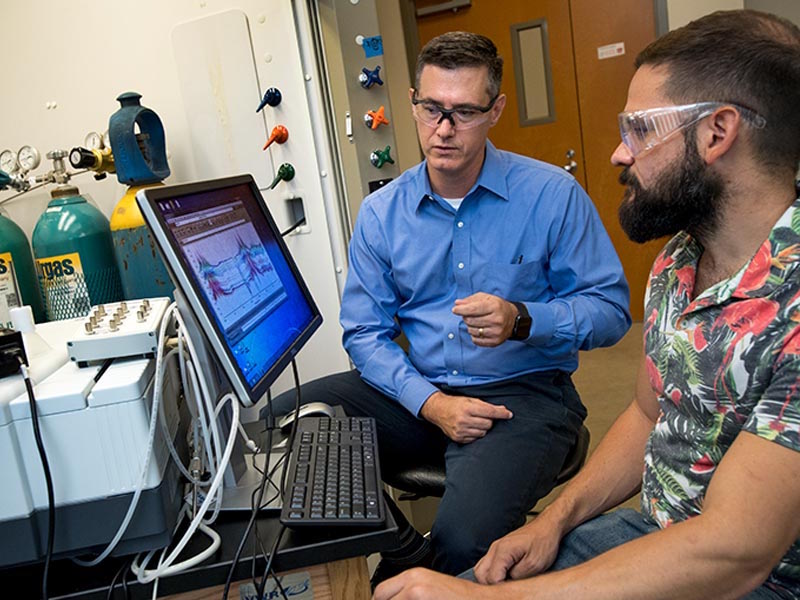Tulane Shantz Lab receives grant to reduce auto emissions
Courtesy of Paula Burch-Celentano
Professor Daniel Shantz (left) and graduate student Ross Ransom (right) analyze data from their research of zeolite SSZ-39 in an effort to reduce harmful chemicals in auto emissions.
The Shantz Lab, part of Tulane University’s Department of Chemical and Biomolecular Engineering, recently received a grant to research ways to reduce harmful auto emissions into the environment. The funding is being provided by SACHEM, Inc., a global chemical sciences company recognized for its commitment to environmental safety.
Dr. Daniel Shantz, the Entergy chair of clean energy engineering and head of the Shantz Lab, will lead members of his lab to work in collaboration with SACHEM scientists to find ways in which the harmful environmental effects of auto emissions can be eliminated.
“The specific problem we’re looking at is working on materials that will be more robust, more stable, more longer-lasting as part of the emissions systems in heavy diesel trucks,” Shantz said.
Over time, auto emissions pose a significant threat to the atmosphere. As diesel fuels continue to be used up by automobiles and are released into the air, the release of nitrogen oxides and other emissions of fuel exhaust build up in the atmosphere and can result in acid rain.
“The tolerated amount of nitrogen oxide emissions continues to be smaller and smaller,” Shantz said. “This was a significant environmental problem which has generally been mitigated because of advancement in emission abatement technologies.”
Though the issue of acid rain caused by oxides in the atmosphere is becoming less of a problem due to continued technological advancement, the problem still remains. The Shantz Lab looks to mitigate the problem of auto emissions by controlling the properties of materials involved in the process.
Shantz explained that the problem with emissions systems currently in use is that they only operate within a temperature range of about 300-400 degrees Celsius. Though most emissions systems typically operate in this range, there are instances when the materials being used will be forced to operate at extremely high temperatures. These instances are known as temperature excursions. Because the materials aren’t designed to operate at such high temperatures, they tend to lose the properties they need to reduce auto emissions.
“What we’re looking at is, by controlling the material properties, can we make materials that … eliminate these nitrogen oxides emissions, but also at the same time … would be able to handle these temperature excursions without losing their desirable properties,” Shantz said.
As a professor, Shantz works with many graduate and some undergraduate students in his lab and trains them to conduct research impacting the energy sector. Shantz believes the funding given to his lab not only signifies an interest in the research being conducted through the Chemical and Biomolecular Engineering Department, but also represents an opportunity for graduate students in his lab to develop scientific insights that will allow them to work on problems with real world applications.
“When [the students] finish their degree [at Tulane, they] can go work at a company like SACHEM or other companies in the chemical industry and help solve problems that those companies think are important that society also thinks are important,” Shantz said.
According to Schantz, building partnerships with companies like SACHEM can provide graduate students with training opportunities and resources that can benefit both society and the students in their own careers.
“What we found is an industrial partner who wants to support the graduate training mission at Tulane,” Shantz said. “They’re contributing resources to support and train [the] graduate student[s] … to do basic fundamental research that [they are] very interested in because, on the one hand, it certainly has an economical impact for them potentially, but also, more generally as a society, we’re concerned about the environment.”
Your donation will support the student journalists of Tulane University. Your contribution will allow us to purchase equipment and cover our annual website hosting costs.

















Leave a Comment